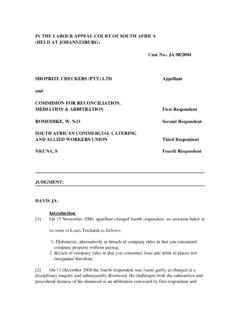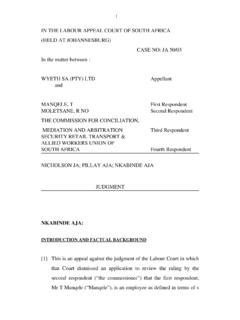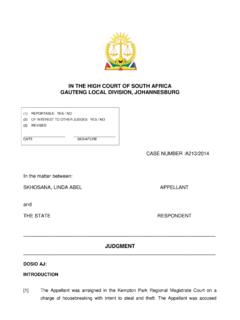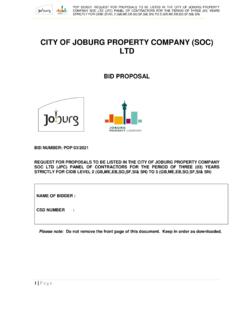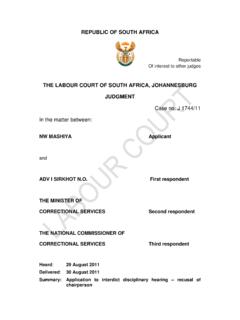Transcription of HELD AT JOHANNESBURG JA 88/97 PETRO MAGDA …
1 IN THE LABOUR APPEAL COURT OF SOUTH AFRICAHELD AT JOHANNESBURGCase Number: JA 88/97In the matter betweenPETRO MAGDA GEERDTSA ppellantandMULTICHOICE AFRICA (PTY) LIMITEDR espondentJUDGMENTN icholson JA[1]The appellant was employed by the respondent as a public relations manager. She reported to her manager Mr Cobus Scholtz from January 1995. During the course of her employment Ms Robyn de Villiers of Arcay Corporate Communications, an outside consultant, was engaged to do an assessment of appellant s department, whilst the appellant dealt with certain special projects.[2]On 23 May 1996 the appellant was given notice to attend a disciplinary enquiry which proceeded on 27 and 28 May 1996. The appellant was charged with unlawfully recording a private business meeting held by Scholtz and two other persons.
2 The 1appellant disputed making the recording. She was found guilty at the enquiry and dismissed on 28 May 1996.[3]On 31 May 1996 the appellant lodged an appeal against the decision of the disciplinary enquiry. She also brought proceedings in terms of sections 17(11), 43 and 46(9) of the Labour Relations Act, No. 28 of 1956, ( the Act ). In the last mentioned proceedings she sought a declaration that her dismissal was an unfair labour practice and that pursuant to such a declaration she be reinstated in her former position. Urgent relief sought in terms of section 17(11) was refused. The application in terms of section 43 resulted in a reinstatement order which was not put into effect. [4]Initially only appellant testified in the industrial court on her own behalf. After Scholtz, De Villiers and Ms Kumarie Naranjee had testified for respondent, appellant successfully applied to reopen her case and called Ms Kezanne Riley.
3 After a 13 day trial in the industrial court her section 46(9) application was refused and the court made an order that she pay the costs of the respondent on the High Court scale. The decision by the industrial court was handed down on 6 August 1997 and reasons were furnished on 5 September 1997. No findings were made on credibility and the court a quo found that on a conspectus of all the relevant facts and probabilities appellant s version fell to be rejected. This is an appeal from that unfairness2[5]Mr Bruwer, who appeared in this court as well as the industrial court for the appellant, submitted that it was procedurally unfair that the respondent did not lead the evidence at the disciplinary enquiry and in the industrial court of Dr Jansen, an expert who examined the tape used to record the meeting to see if anyone had tampered with it.
4 Although appellant was not allowed the services of a legal practitioner at the disciplinary enquiry as the disciplinary code made no allowance for that, it was common cause that appellant was receiving advice from counsel during that period. As the evidence of Dr Jansen was never led it was not clear what his findings encompassed and that his examination had been conducted at the time of the enquiry. Assuming that it had been, I am not convinced that appellant was prejudiced by the failure by company to call such evidence. Appellant could always have called Dr Jansen at both proceedings and declined to do so despite being advised at the time by counsel. Scholtz identified the original tape and it was handed in as an exhibit. He categorically denied that anyone had tampered with it. There was no evidence to contradict this.
5 In any event, given the issues that emerged in the industrial court, namely whether appellant recorded the meeting accidentally or whether Scholtz taped it to frame appellant, it does not seem to me to matter whether the tape was tampered with or not.[6]The second instance of procedural unfairness relied on by Mr Bruwer related to the alleged failure of respondent to afford appellant the right of appeal guaranteed her in the disciplinary code. That such a right existed admits of no dispute. Appellant could have utilised such a right. The respondent made an offer of such an appeal to be held 3during the week of 15 July 1996 in a letter dated 3 July 1996. The offer of the appeal was made subject to the appellant withdrawing her section 43 application. This letter records Mr Bruwer as having addressed the industrial court on the section 43 application on the basis that the appeal had been abandoned.
6 Appellant declined the offer of the appeal subject to the withdrawal in a letter dated 5 July 1996. The appellant was entitled to exhaust her domestic remedies first and then utilise the machinery of the Act. There was no question that she would have lost any right to use section 43 after her internal appeal hearing. She chose rather to embark on an application in terms of section 43. By invoking this section she waived reliance on her domestic right of appeal. Substantive unfairness[7]Mr Bruwer has criticised the finding of the industrial court that the dismissal of appellant involved no unfair labour practice on a number of grounds. It is necessary to look at the version of the appellant and the other evidence in the case to determine whether these criticisms are justified. In the industrial court the appellant testified as follows with regard to the events of 21 May 1996.
7 She arrived at work at 6am and took her husband s son to school. On her return she worked at Naranjee s desk until the phone rang. The call was from Scholtz who advised the appellant that he would be late for a meeting and that she should advise De Villiers of this fact. Naranjee arrived and unlocked Scholtz s office. The appellant followed her into the office explaining that she had arranged with Scholtz the previous day that she would fetch a bottle of 4wine for Mr Marius Steyn. The appellant was shown where the wine was kept and she took a bottle and left. She had a sling bag with her which she left there accidentally. [8]The first bottle of wine was to replace one taken from the managing director Mr Koos Bekker and she went into Scholtz s office a second time to fetch another bottle which would be from Scholtz to the colleague.
8 At the time of this second visit Scholtz had two people with him and the appellant took the wine, with Scholtz s permission, and left immediately. Appellant s reason for fetching the second bottle of wine in the disciplinary enquiry changed once it became clear that Steyn had already received a bottle of wine the previous day.[9]The appellant then proceeded with her work. She had used a dictaphone in the car to dictate notes to herself and this was in her sling bag. As she could not find her sling bag, she asked Naranjee if she had seen it. She had not and the two then looked through the window, which separated Naranjee s office from that of Scholtz, and saw the bag against the cupboard that housed the wine. The appellant asked Naranjee to fetch the bag when she took tea into the meeting.
9 Naranjee explained that she had already made tea. The appellant then said that she would fetch it after the meeting.[10]When the meeting was over she went in and Scholtz asked her why she was recording his meeting. She enquired as to why she would want to record the meeting and suggested that Scholtz might have turned the dictaphone on accidentally, when 5removing it from the bag. On playing back the tape it became clear that parts of the meeting had been recorded. Two members of the human resources department and the head of security were called and appellant was subsequently suspended.[11]From the above account it is clear that appellant was relying on accidentally recording the meeting and at the disciplinary hearing, the section 17(11) and 43 proceedings, she persisted in such a defence, including suggesting a number of ways in which the dictaphone could have been switched on.
10 An example of her evidence at the disciplinary enquiry reads as follows Its been on my mind since Tuesday and the only thing I could ve done was when I rewinded it, okay, I must ve stopped it, either by that method I normally do it by the stop button off rewind it and then put it into my bag like that. All I can think that is that I would ve pressed the top button record which automatically takes the play button with it. Some dictaphones you ve got to physically press both, at the same time. But, all I can think is that the record button, as I put it into my pocket here, it went down like that. Okay, that s all I can think of. I cannot offer any other explanation, at this stage of the game and believe me, I ve tried to rack my brains. [12]In the replying affidavit filed by the appellant in section 43 application appellant deals with the allegation by Scholtz that she deliberately taped the meeting.










